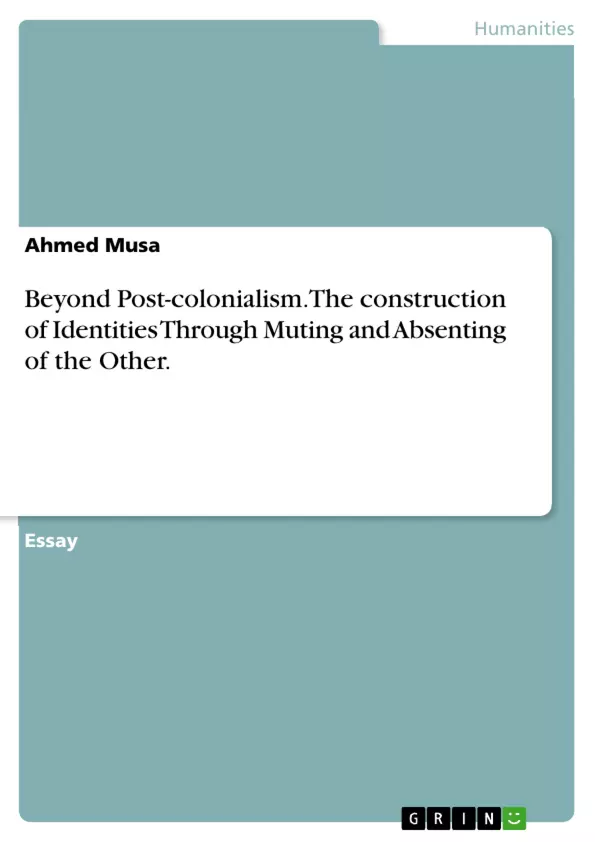This paper is an attempt to trace the absence of the West in the cultural creative modes of knowledge productions that emerged post the Arab social movements in Tunisia and Egypt.
Whenever we discuss or approach the subject of the construction of identities in post-colonial studies: the West- who I represent here as the "other"- is largely but not entirely perceived as consolidating against or formulating the identities of the East or the identities of the "Rest". This is evident in not only the revered works of prominent theorists like Edward Said, Homi Bhabha, and Gayatri Spivak, but also in the works of other post-colonial theorists and writers that emerged afterward. However, during the Arab Spring – one of the most solidaristic and transcultural Arab movements that searched for more stable governing models at crossroads of global, regional, and national challenges- creative new forms of formulating identities beyond post-colonial theory emerged, such as; the Arab Spring poetic slogans as creative modes of knowledge production, which moved away from the previous discourse of the post-colonial Arab intellectuals built on a bifurcation identity, and also in tandem revolting the internal regimes of knowledge production.
The new forms of cultural productions not only represented moments of self-emergency, social solidarity, and construction of the "self'"during traumatic moments, but also in tandem absented and muted the West and East binaries and antithesis of representation.
Inhaltsverzeichnis (Table of Contents)
- Abstract
- Introduction
- Post-colonial identities and formations
- Beyond Post-Colonial Identities. Slogans as new modes of knowledge production and agency.
- A fraction of the Egyptian Poetic slogans of the Arab spring
- A fraction of the Tunisian poetic slogans of the Arab Spring
- Conclusion
- References
Zielsetzung und Themenschwerpunkte (Objectives and Key Themes)
This paper aims to explore the emergence of new forms of identity construction in the Arab Spring movements, particularly in Tunisia and Egypt. It examines how these movements, through creative cultural productions like poetic slogans, challenged and transcended traditional post-colonial discourses that often positioned the West as the dominant force in shaping identities in the East. The paper analyzes how these new forms of knowledge production emerged as a response to internal regimes of knowledge production, fostering a sense of self-empowerment and solidarity.
- The construction of identity in post-colonial contexts
- The role of cultural productions in shaping identities
- The impact of the Arab Spring on identity formation
- The emergence of new modes of knowledge production
- The transcendence of traditional post-colonial discourses
Zusammenfassung der Kapitel (Chapter Summaries)
- Introduction: The introduction sets the context for the paper by discussing the relationship between the people and cultural productions in the Arab uprisings, particularly in Egypt and Tunisia. It emphasizes the role of collective imagination and cultural productions in fostering a sense of empowerment and challenging existing power structures.
- Post-colonial identities and formations: This chapter delves into the core concepts of post-colonial studies, focusing on the construction and representation of identity within colonial and post-colonial contexts. It examines Stuart Hall's perspective on cultural identities, highlighting the two key models: "one people" and "becoming," and how they relate to the concept of identity as a relational and dynamic process.
- Beyond Post-Colonial Identities. Slogans as new modes of knowledge production and agency: This section explores the emergence of new forms of knowledge production, particularly poetic slogans, as a response to the Arab Spring movements. It examines how these slogans transcend traditional post-colonial discourses and offer alternative modes of identity construction and self-expression.
Schlüsselwörter (Keywords)
The main keywords and focus topics of the text are Arab Spring, identity, post-colonialism, absenting, poetic slogans, cultural productions, and knowledge production. The paper examines how these concepts intersect and influence one another in the context of the Arab Spring movements, particularly in Tunisia and Egypt.
- Quote paper
- Ahmed Musa (Author), 2021, Beyond Post-colonialism. The construction of Identities Through Muting and Absenting of the Other., Munich, GRIN Verlag, https://www.hausarbeiten.de/document/1032419


